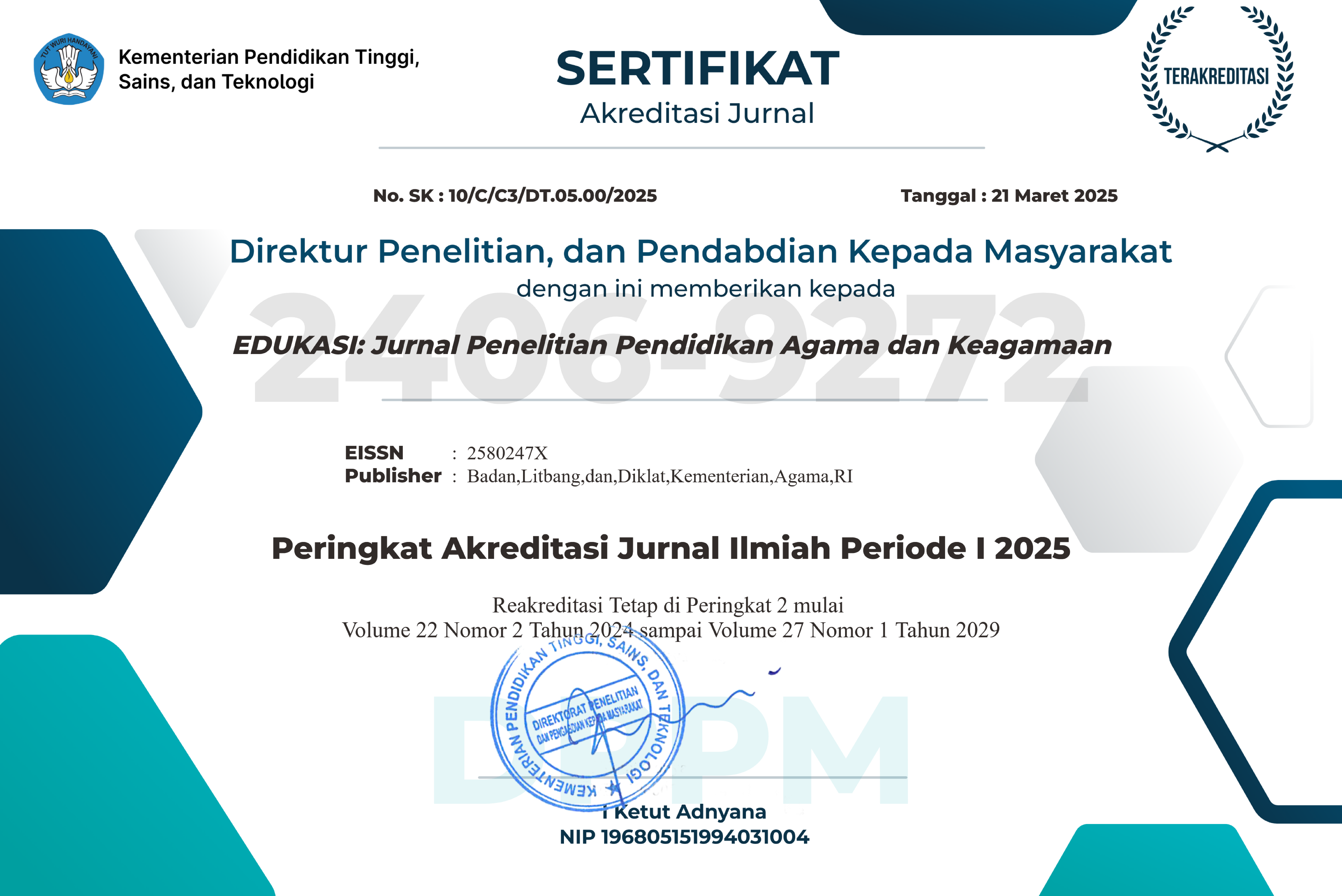KESIAPAN MADRASAH DALAM PELAKSANAAN WAJIB BELAJAR 12 TAHUN
DOI:
https://doi.org/10.32729/edukasi.v10i2.158Keywords:
Compulsory Education, Madrasah (Islamic Schools), Education Access, Wajib Belajar, Madrasah, Akses Pendidikan.Abstract
Abstract
The purpose of this study is to determine: 1) local government policies in the implementation of 12-year compulsory education, 2) policies of the Ministry of Religious Affairs on the implementation of 12-year compulsory education in Madrasah Aliyah (Islamic Senior High School) and 3) the readiness of Islamic Senior High School in infrastructure, financial, and educational staff aspects of 12-year comÂpulsory education. This study used the qualitative approach with a policy analysis. Data sources were obtained and collected from interviews, observation and documentation. The findings included: compleÂtion of 9-year compulsory education at Elementary School/ Islamic Elementary School and Junior High School / Islamic Junior High School in Districts / Cities of the study target areas completed, except for a small portion of areas whose GER and NER have not met 95% as pilot program requirements of 12- year compulsory education. Policies of Provincial, District, and City Governments have largely led to the pilot program of 12-year compulsory education. Meanwhile, the policies of the Ministry of Religious Affairs had not prepared the regulatory device, either regulations, guidelines or other technical guidance related to the pilot program of 12-year compulsory education in Islamic Senior High School. The asÂpect of the availability of infrastructure and facilities in Public Islamic Senior High School is adequate and appropriate to the national standards, whereas most Private Islamic Senior High School does not meet minimum standards based on the standardized infrastructure and facilities. Meanwhile, for the financing aspect, no balance between revenue and expenditure is yet found, especially at Private Islamic Senior High School annually.
Abstrak
Tujuan penelitian ini adalah untuk mengetahui: 1) kebijakan Pemerintah daerah terhadap penyeÂlenggaraan wajib belajar 12 Tahun, 2) kebijakan Kementerian Agama terhadap pelaksanaan program wajib belajar 12 tahun di Madrasah Aliyah dan 3) kesiapan Madrasah Aliyah dalam aspek saranaÂprasarana, pembiayaan, dan tenaga kependidikan dalam program wajib belajar 12 tahun. Penelitian ini menggunakan pendekatan kualitatif dengan analisis kebijakan (policy analysis). Sumber data digali dan dikumpulkan dari hasil wawancara, observasi dan dokumentasi. Hasil penelitian ditemukan antara lain: Penuntasan wajib belajar pendidikan dasar 9 tahun pada jenjang SD/MI dan SMP/MTs di KaÂbupaten/Kota pada daerah sasaran penelitian telah tuntas, kecuali sebagian kecil daerah yang APK dan APM belum memenuhi 95% sebagai sarat rintisan program wajib belajar 12 tahun. Kebijakan Pemda Propinsi, Kabupaten, dan Kota sebagian besar telah mengarah pada rintisan program wajib belajar 12 tahun. Sedangkan kebijakan Kementerian Agama belum menyiapkan perangkat regulasi, baik peraturan, pedoman, dan petunjuk teknis lainnya terkait rintisan program wajib belajar 12 tahun di madrasah Aliyah. Pada aspek ketersediaan sarana prasarana di MAN telah memadai dan sesuai standar nasional, sebaliknya di madrasah swasta sebagian besar belum memenuhi standar minimum berdasarkan standar sarana prasarana. Dan pada aspek pembiayaan belum terjadi keseimbangan antara pendapatan dan pengeluaran khususnya pada madrasah swasta dalam setiap tahunnya.








